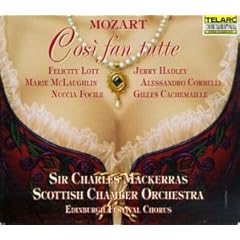Mackerras conducts Cosi (in English)
Posted by: Tam on 17 April 2008

Sir Charles Mackerras's additions to Chandos's Opera in English series are always worth ago (but then I would say that about any of his recordings), indeed, his last one, Humperdinck's Hansel and Gretel just won a Grammy (the first opera in translation to do so). His latest, Mozart's Cosi fan tutte is no exception.
I'm rather new to Cosi. I've never seen it live and have only recently been introduced to it on CD, by means of Mackerras's earlier recording with the Scottish Chamber Orchestra on Telarc (with Felicity Lott and Jerry Hadley). Musically I'm not as swept away by it as I am by Figaro, The Magic Flute or Don Giovanni. The plot is also extremely silly (but then it's just as silly for Figaro and The Magic Flute, so that's not really a fair complaint).
What this recording really makes me regret, however, is that it was Parry, not Mackerras, who conducted the Chandos Figaro as that would have been quite something.

The first big difference to the earlier reading is that here Mackerras's orchestral partner is the period ensemble The Orchestra of the Age of Enlightenment. Now, feelings on period instruments vary, personally I prefer the sound of a modern instrument (I find them more rounded and polished) but with someone like Mackerras conducting the distinction always blurs somewhat.
I've said in the past that I think Mackerras has sped up in the last decade or so, and this Cosi certainly feels more energetic than his 1993 effort.
The singers on offer here are very fine too. The sisters are played by Janice Watson (who previously collaborated with Mackerras in the title role of the Opera in English Jenufa) and Diana Montague. Christopher Maltman and Toby Spence are the officers with Sir Thomas Allen on fine form as Don Alfonso. Despina is played by a slightly past it Lesley Garrett (a role where this is not a huge problem, as it sometimes calls for just that, however she is not nearly so successful as she was as Papagena on the Mackerras/Opera in English Magic Flute).
Musically, it is a little difficult to chose. I think the later reading is the more exciting but I think the SCO play better for Mackerras than do the OAE (if only the current recording had been made with the Scottish orchestra whose recent Mozart collaborations with Mackerras have been second to none).
Vocally, purists will rule this set right out on the grounds of the translation. I think they would be mistaken. I maintain that when done well, opera in translation works superbly. Of course, it doesn't always - take the French and Italian versions of Don Carlos, the former can sound very odd when not performed by Francophone singers (see here for a fuller discussion of this example). A common complaint, though, is that the words grate against the music in translation. My contention would be that the words grate against the music [B]when performed badly[B] in translation. And while that happens at times on the Parry Figaro, it does not happen with Mackerras. That said, the translation does take some liberties to achieve this (but given how silly the plot is, I don't mind this too much). There are those who say one should play as Mozart intended, but I would not that Verdi was happy for Don Carlos to be played in either French of Italian and that Mozart himself was quite happy not only to translate the Messiah into German but also the rearrange it to boot.
However, if that were the only concern it would all be sweetness and light. It isn't quite. The main justification of Opera in English is to make it intelligible, accessible, to the audience. That is only possible if the words are clearly audible. Now, I've heard it said that even in native language, someone who is fluent will rarely be able to make out every word. What is important, I'm sure, is that they sing beautifully first (which, here, they do, some of Garrett's work excepted), and make as much as possible intelligible second. This the men do superbly and the women do less well. Indeed, their clarity is not quite good enough. I suspect this may be more in the role as Mackerras, with his Gilbert and Sullivan pedigree is a stickler for good diction (it is essential in G&S).
However, those flaws shouldn't put you off checking out this superb and very enjoyable set. Neither should the price: Amazon currently have it at under £12 which, for three discs with a full libretto, seems absurdly cheap. (Those who insist on Italian will find themselves paying 3-4 times as much for Mackerras).
One last thing, there's a nice interview with Mackerras on the (and I apologise for this in advance) Classic FM website.
regards, Tam
